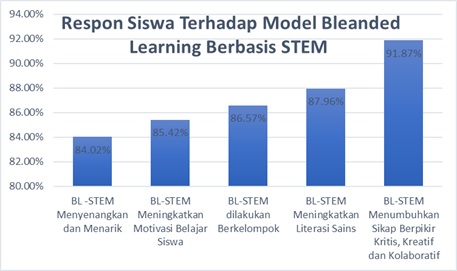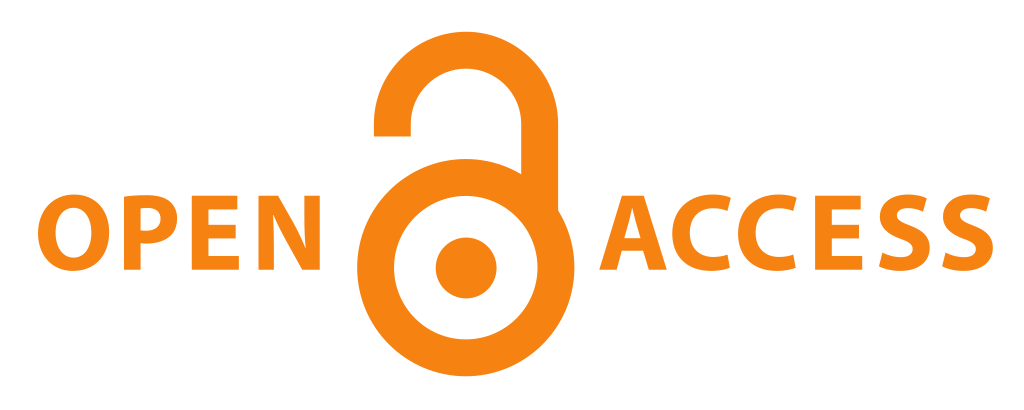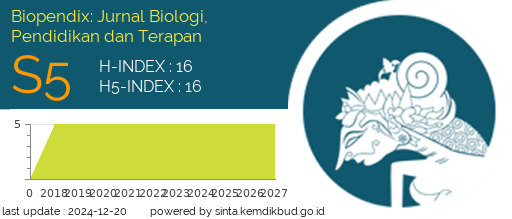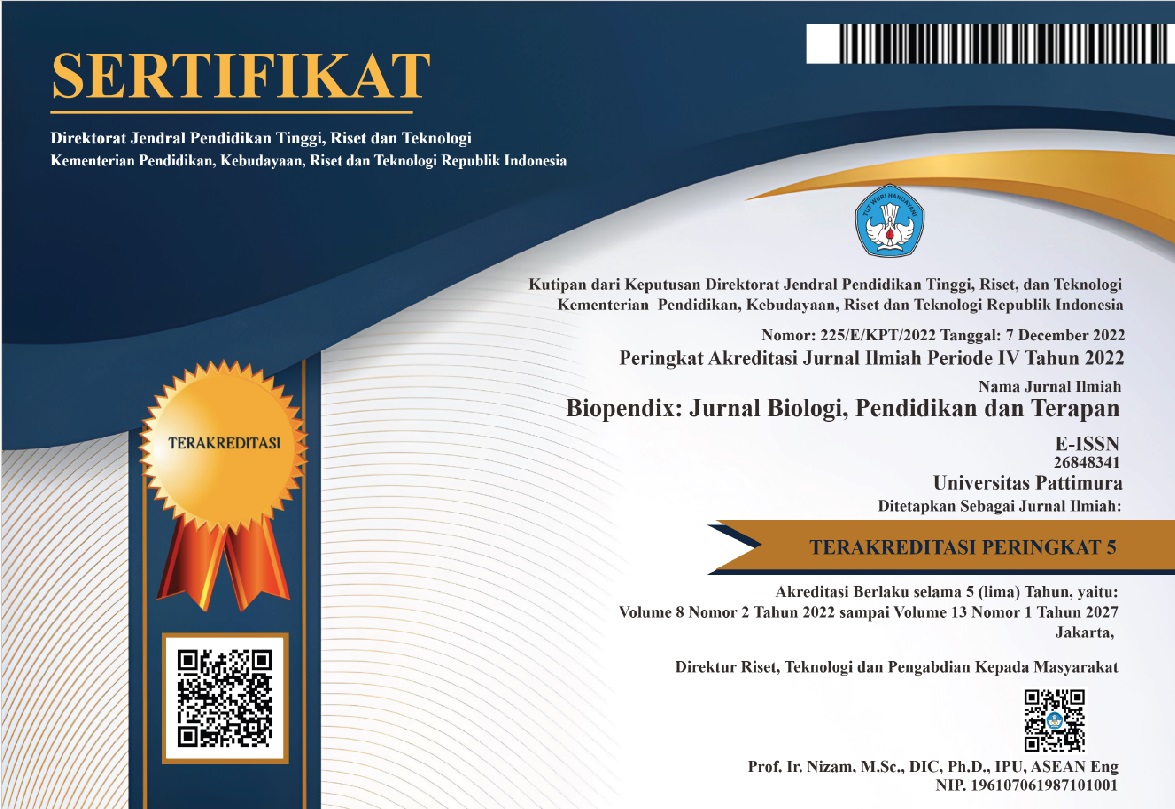APPLICATION OF STEM-BASED BLENDED LEARNING TO THE COGNITIVE ABILITIES OF 11 AMBON STATE SENIOR HIGH SCHOOL STUDENTS
Abstract
Background: Blended learning is a mixed learning model between face-to-face and online learning. The STEM-based blended learning model can guide and train students to think logically, critically, evaluatively, creatively in solving problems and making decisions related to dealing with life's problems by utilizing technology and applying it in real life.
Methods: The type of research used was a pre-experimental design with one group pretest-posttest. The research was located at SMA Negeri 11 Ambon and was carried out on January 2022. The research subjects were 36 students in class XII MIA-4 at SMAN 11 Ambon in the 2021-2022 academic year.
Results: The results of the study show that there is a fairly effective effect in improving cognitive outcomes in class XII students of SMA Negeri 11 Ambon.
Conclusion: There is an influence of the application of blended learning with the STEM approach to increasing scientific literacy and cognitive abilities of class XII students of SMA Negeri 11 Ambon in the new normal period
Downloads
References
Borup, J., Chambers, C., & Srimson, R. (2019). Online teacher and on-site facilitator perceptions of parental engagement at a supplemental virtual high school. International Review of Research in Open and Distance Learning, 20(2). https://doi.org/10.19173/irrodl.v20i2.4237
Bryan A ; K.N. Volchenkova. (2016). Blended Learning: Definition, Models, Implications For Higher Education. Bulletin of the South Ural State University. Ser. Education, Vol 8 No 2, 24–30. https://doi.org/DOI: 10.14529/ped160204
Budiharti, R., Ekawati, E. Y., Pujayanto, Wahyuningsih, D., & Adilah, D. N. (2015). Kajian kualitatif efektivitas blended learning IPA terpadu berbasis SETS Di SMP Wilayah eks Karesidenan Surakarta. Jurnal Materi Dan Pembelajaran Fisika, 5(2014), 35–41.
Ceylan, S., & Ozdilek, Z. (2015). Improving a Sample Lesson Plan for Secondary Science Courses within the STEM Education. Procedia - Social and Behavioral Sciences, 177. https://doi.org/10.1016/j.sbspro.2015.02.395
Creswell, J. W., & Creswell, J. D. (2014). Research and Design Qualitative, Quantitative and Mixed Methods Approaches. Thousand Oaks California.
Daugherty, M. K. (2013). The Prospect of an “A” in STEM Education. Journal of STEM Education: Innovations and Research, 14(2).
Dhawan, S. (2020). Online Learning: A Panacea in the Time of COVID-19 Crisis. Journal of Educational Technology Systems, 49(1). https://doi.org/10.1177/0047239520934018
Dziuban, C., Graham, C. R., Moskal, P. D., Norberg, A., & Sicilia, N. (2018). Blended learning: the new normal and emerging technologies. International Journal of Educational Technology in Higher Education, 15(1). https://doi.org/10.1186/s41239-017-0087-5
Erwinsyah, A. (2016). Pengelolaan pembelajaran sebagai salah satu teknologi dalam pembelajaran. Tadbir: Jurnal Manajemen Pendidikan Islam, 4(2).
Fitriyani, Y., Fauzi, I., & Sari, M. Z. (2020). MOTIVASI BELAJAR MAHASISWA PADA PEMBELAJARAN DARING SELAMA PANDEMIK COVID-19. Profesi Pendidikan Dasar, 7(1), 121–132. https://doi.org/10.23917/ppd.v7i1.10973
Hanif, H., Ibrohim, I., & Rohman, F. (2016). Pengembangan Perangkat Pembelajaran Biologi Materi Plantae Berbasis Inkuiri Terbimbing Terintegrasi Nilai Islam Untuk Meningkatkan Pemahaman Konsep Siswa Sma. Jurnal Pendidikan: Teori, Penelitian, Dan Pengembangan, 1(11), 2163—2171-2171.
Kazu, I. Y., & Demirkol, M. (2014). Effect of blended learning environment model on high school students’ academic achievement. Turkish Online Journal of Educational Technology, 13(1), 78–87.
Kuswana, W. S. (2013). Taksonomi Berpikir. PT Remaja Rosdakarya.
Lestari, H. (2020). Literasi Sains Siswa Melalui Penerapan Model Pembelajaran Blended Learning Dengan Blog. NATURALISTIC : Jurnal Kajian Penelitian Pendidikan Dan Pembelajaran, 4(2b). https://doi.org/10.35568/naturalistic.v4i2b.769
Lestari, H., Banila, L., & Siskandar, R. (2019). Improving Student’S Science Literacy Competencies Based on Learning Independence With Stem Learning. … : Jurnal Biologi Dan …, 14(2), 18–23.
Lestari, H., & Siskandar, R. (2020). Cultivating Green Behavior of Eco Literation-Based Elementary School Students during the COVID-19 Pandemic. Jurnal Penelitian Pendidikan IPA, 7(1). https://doi.org/10.29303/jppipa.v7i1.477
Lestari, H., Siskandar, R., & Rahmawati, I. (2020). Digital Literacy Skills of Teachers in Elementary School in The Revolution 4.0. The 2ndInternational Conference on Elementary Education, 2(1).
Lestari, H., & Widodo, A. (2021). Peranan Model Pembelajaran Nature Of Sains Terhadap Peningkatan Pemahaman Sains Siswa Di Sekolah Dasar. Jurnal Cakrawala Pendas, 7(1). https://doi.org/10.31949/jcp.v7i1.2425
Purwanto. (2013). Evaluasi Hasil Belajar. Pustaka Pelajar.
Purwanto, N. (2006). Prinsip-prinsip dan Teknik Evaluasi Pengajaran (Ke13 ed.). Remaja Rosdakarya.
Richardson, J. W., Lingat, J. E. M., Hollis, E., College, R., & Pritchard, M. (2020). Shifting teaching and learning in online learning spaces: An investigation of a faculty online teaching and learning initiative. Online Learning Journal, 24(1). https://doi.org/10.24059/olj.v24i1.1629
Sadler, T. D., & Zeidler, D. L. (2009). Scientific literacy, PISA, and socioscientific discourse: Assessment for progressive aims of science education. Journal of Research in Science Teaching, 46(8). https://doi.org/10.1002/tea.20327
Setyosari, P. (2014). Menciptakan Pembelajaran Yang Efektif Dan Berkualitas Punaji Setyosari Jurusan Teknologi Pendidikan, Fakultas Ilmu Pendidikan, Universitas Negeri Malang Jl . Semarang No . 5 Malang Jawa Timur 65145 Creating The Effective And The Quality Of The Learning. Jurnal Inovasi Dan Teknologi Pembelajaran, 1(1), 20–30. http://journal2.um.ac.id/index.php/jinotep/article/view/2103
Soler, R., Soler, J. R., & Araya, I. (2017). Subjects in the Blended Learning Model Design. Theoretical-Methodological elements. Procedia - Social and Behavioral Sciences, 237. https://doi.org/10.1016/j.sbspro.2017.02.120
Sopandi, W. (2019). Sosialisasi dan Workshop Implementasi Model Pembelajaran RADEC Bagi Guru-Guru Pendidikan Dasar dan Menengah. Pedagogia : Jurnal Pendidikan, 8(1), 19–34. https://doi.org/10.21070/pedagogia.v8i1.1853
Suwarna. (2016). Materi untuk Ujian Kepribadian Kepala Sekolah Berprestasi. Dinas Dikpora Yogyakarta.
Trianto. (2013). Mendesain Model Pembelajaran Inovatif Progresif. Kencana Prenada Media Grup.
Yuliati, Y. (2017). Literasi Sains Dalam Pembelajaran Ipa. Jurnal Cakrawala Pendas, 3(2). https://doi.org/10.31949/jcp.v3i2.592

Authors who publish with this Journal agree to the following terms:
- Author retain copyright and grant the journal right of first publication with the work simultaneously licensed under a creative commons attribution license that allow others to share the work within an acknowledgement of the work’s authorship and initial publication of this journal.
- Authors are able to enter into separate, additional contractual arrangement for the non-exclusive distribution of the journal’s published version of the work (e.g. acknowledgement of its initial publication in this journal).
- Authors are permitted and encouraged to post their work online (e.g. in institutional repositories or on their websites) prior to and during the submission process, as it can lead to productive exchanges, as well as earlier and greater citation of published works




 2
2






